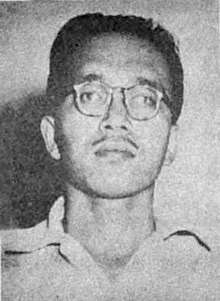Burhanuddin Harahap | |
|---|---|
 Official portrait, c. 1952 | |
| 9th Prime Minister of Indonesia | |
| In office 12 August 1955 – 24 March 1956 | |
| President | Sukarno |
| Deputy |
|
| Preceded by | Ali Sastroamidjojo |
| Succeeded by | Ali Sastroamidjojo |
| 8th Minister of Defense | |
| In office 12 August 1955 – 24 March 1956 | |
| President | Sukarno |
| Prime Minister | Himself |
| Preceded by | Iwa Koesoemasoemantri |
| Succeeded by | Ali Sastroamidjojo |
| Personal details | |
| Born | 12 February 1917[a] Medan, Dutch East Indies |
| Died | 14 June 1987 (aged 70) Jakarta, Indonesia |
| Resting place | Tanah Kusir Cemetery |
| Political party | Masyumi |
| Alma mater | Gadjah Mada University (Mr.) |
| Occupation |
|
Burhanuddin Harahap (EVO: Boerhanoeddin Harahap; 12 February 1917 – 14 June 1987) was an Indonesian politician and lawyer who served as prime minister of Indonesia from August 1955 until March 1956. He was a member of the Masyumi Party and served as Minister of Defense concurrently with his tenure as prime minister. Afterward, he took part in the unsuccessful Revolutionary Government of the Republic of Indonesia (PRRI) rebellion in West Sumatra.
He was born into a Batak family in North Sumatra. He moved to Java to pursue higher education, becoming active in Islamic student organizations and enrolling in the Rechts Hogeschool in Batavia (now Jakarta) before his studies were interrupted by the Japanese invasion in 1942. During the Japanese occupation, he served as a public prosecutor in state courts in Jakarta and Yogyakarta. Following the proclamation of Indonesian independence, he became more involved in politics, joining Masyumi and rising through its ranks to become a prominent party member, becoming the leader of Masyumi's parliamentary faction by 1950.
In 1953, Burhanuddin contributed to the collapse of Prime Minister Wilopo's cabinet and unsuccessfully attempted to form a new cabinet. After the downfall of Prime Minister Ali Sastroamidjojo's first cabinet, he was given another chance and formed a caretaker government with the Nahdlatul Ulama (NU) and several minor political parties. As prime minister, Burhanuddin reversed many of his predecessor's policies. He adopted a pragmatic economic policy, abolishing the pro-indigenous Benteng program, while seeking to remove the influence of the Indonesian National Party and Indonesian Communist Party from the military and government. Additionally, his government initiated some measures towards Acehnese autonomy and dissolved the Netherlands-Indonesian Union in 1956. The poor performance of Masyumi in the 1955 election, however, weakened the cabinet's political position and alliance with NU. In the last weeks of his government, international negotiations over the Western New Guinea dispute broke down the coalition, with his tenure ending in March 1956.
Political tensions forced him to flee to Sumatra in 1957, and he joined PRRI upon its declaration in February 1958. Within PRRI, Burhanuddin was appointed minister of defense and justice in the revolutionary government's declared cabinet. Following continued military setbacks of the movement, the movement's leaders retreated into the jungles and mountains, and by August 1961 Burhanuddin had surrendered to authorities. Initially permitted to remain free, he was arrested in March 1962 and imprisoned until Sukarno's fall in 1966. Following his release, he largely left politics, although he took part in the 1980 Petition of Fifty documents, which criticized President Suharto's use of Pancasila against political opponents before he died in 1987.
Cite error: There are <ref group=lower-alpha> tags or {{efn}} templates on this page, but the references will not show without a {{reflist|group=lower-alpha}} template or {{notelist}} template (see the help page).